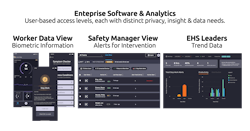High-tech PPE Data Collection Addresses Privacy Concerns
In the age of Covid-19 as companies begin to use wearable industrial devices to improve worker safety, one high-tech PPE maker has debuted a new privacy policy for its system.
Kenzen's policy details the type of information collected from a worker, how a worker can opt out of the system, how long the data is available, and who owns it.
The company recently launched a physiological monitoring system to detect heat, overexertion, and illness.
The system collects 1.3 million data points per worker per day. The information is meant to protect the workers from injury on the job while helping to optimize total worker health. Three distinct views of the data are available at different levels within a company, one for the worker, one for the safety supervisor, and one for corporate EHS.
Kenzen’s proprietary algorithms filter data at each level to keep the most private information available only to the worker. When the information indicates a need for an intervention to prevent the worker from overheating, an alert and suggested next steps are sent to the supervisor.
At the corporate level, health and safety teams receive anonymized trend information derived from the original data, which they use to make decisions to improve safety at the worksite.
The privacy policy is accessible on the Kenzen website to ensure all workers can learn about the system and know their rights when the system is deployed at their worksite.
The technology and the privacy policy were built from the ground up with the worker as the primary focus, according to Heidi Lehmann, co-founder and chief commercial officer of Kenzen. The company collaborated closely with Working Capital Venture Fund, which invests in scalable innovation that meets the demand for more transparent and ethical supply chains which protect workers. San Francisco-based Working Capital, a Kenzen investor, also has offices in Washington D.C., where the firm advocates for workers’ rights.
“The definition of worker safety now includes protection of personal information,” said Lehmann. “From the beginning, we’ve engineered worker privacy into our technology and now have created a standard-setting companion privacy policy. Until now, companies had to weigh the benefits of saving lives and gaining productivity against the risk of exposing workers’ personal data in the process. As the business case for personal monitoring gets stronger, worker privacy safeguards must also get stronger.”
“Kenzen is at its core committed to protecting workers, and this includes respecting their privacy,” said Paarul Dudeja, managing partner at Working Capital Innovation Fund. “As smart PPE becomes essential, other innovators should study Kenzen’s approach to differentiating access to personal information such that it allows the technology to fulfill its promise without compromising the right to privacy.”
“This is a model for all smart PPE companies,” said Kelly DeMarchis Bastide, partner at Venable law firm, which collaborated with Kenzen on the policy and is known for its work in data privacy.
Source: Kenzen





